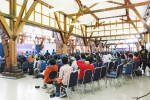FGD with Indonesia’s Minister of Health, Ready to Collaborate for Self-Sufficient Healthcare
By Adi Permana
Editor Adi Permana

BANDUNG, itb.ac.id— The ITB Academic Senate Forum Group Discussion (FGD) was held again by inviting the Republic of Indonesia’s Minister of Health Budi Gunadi Sadikin to discuss “Triple Helix Collaboration in Realizing Health Service Independence.”
This event was held in the ITB Scientific Meeting Hall which was also attended by Dirjen Kefarmasian dan Alat Kesehatan Lucia Rizka Andalusia, ITB Rector Prof. Reini Wirahadikusumah, Ph.D., Chair of Academic Senate Prof. Hermawan Kresno Dipojono, Chair of ITB Research and Innovation Commission, Prof. Trio Adiono, ST., MT., Ph.D., professors and lecturers on Thursday (14/7/2022). Before carrying out the FGD, the Minister of Health first reviewed the products of ITB's research in the health sector together with the ITB Rector, WRRI, SA Chair, FGB Chair, SF Dean, and others from the ITB board.

Prof. Reini expressed her gratitude for the Minister of Health’s presence, with the hopes that through this forum ITB will be able to contribute towards the country’s self-sufficiency, especially in terms of health service innovation. With the triple helix principle, the academics who work closely with regulators and the industry continue to look for ways so that ITB's innovative products can be applied in society.
This is also supported by the Health Minister who stated that within the framework of developing innovative research in universities, campuses cannot work alone, and link and match is needed with industry players. According to him, the health budget in Indonesia is mostly used to cure sick people, not to create healthy people, so promotive and preventive actions are needed. In the presence of the academic senate, the Minister of Health mentioned that ITB's various opportunities to educate the public and make preventative interventions to maintain a healthy life are wide open.
First, the transformation of primary healthcare to meet the needs of each life cycle cluster as a whole. ITB has the opportunity to provide tools that support 15 health services in posyandu relating to pregnant women, such as digital ultrasounds with the help of Artificial Intelligence (AI), and the strengthening of the health lab network at each level for diagnostics and surveillance.
Second, the transformation of referral services in hospitals through optimization of a network of 54 national cardiovascular hospitals. According to data from the Ministry of Health of the Republic of Indonesia, 85% of Indonesians die from heart disease. Around 50,000 children with congenital heart diseases are left untreated. During the forum, Budi said he hopes that there would be open heart surgery services in 2024.
Third, healthcare resilience. ITB has the chance to provide raw materials for vaccines and production of syringe needles. This is because Indonesia is as of right now still unable to produce its own syringe needles, so they still import those products. “Don't let us run out of raw materials like at the start of the pandemic,” Budi said.

Fourth, equal distribution of health workers. The Minister of Health then stated how the government is in the middle of handling 4 death causing and most costly diseases in Indonesia that are heart and kidney diseases, cancer, and strokes as an example. This is due to the limitations in research towards the treatment of these diseases caused by the lack of specialist doctors in Indonesia. With this condition, ITB has the opportunity to make medical devices capable of early detection.
Fifth, health service applications. ITB can build a platform to accommodate healthcare service applications. The platform stated here intends to host healthcare service-related applications. Thus, it will be easier for the people to access healthcare services.
Sixth, healthcare technology. Healthcare and technology should go hand in hand by now. Changes in both the environment and the times have increasingly opened the way for research and innovation in the healthcare sector to be intensified. ITB can elaborate the existing knowledge at ITB with healthcare.
Various directions and inputs from the Minister of Health were welcomed by the ITB Academic Senate. Chair of ITB Academic Senate Prof. Hermawan Kresno Dipojono said that he would immediately follow up the directions and inputs from the Minister of Health and make it a provision for the development of innovative research at ITB in the future.
Reporter: Pravito Septadenova Dwi Ananta (Geological Engineering, 2019)
Translator: Hanna Daniela Ayu (Aerospace Engineering, 2021)

.jpg)
.jpg)

.jpg)
.jpg)


